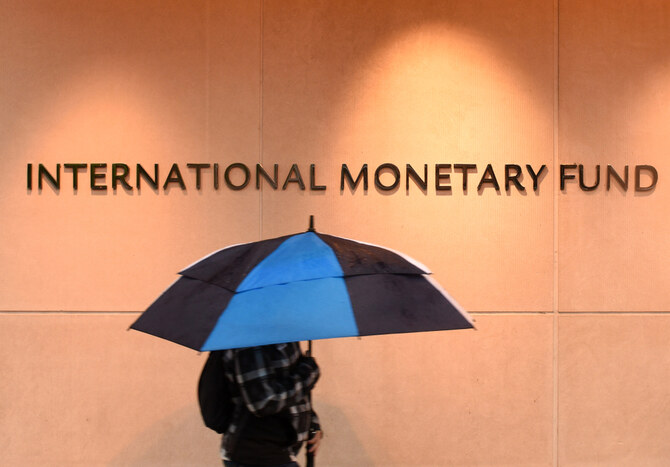RIYADH: Saudi Arabia’s economy is set to expand by 1.5 percent and 4.6 percent in 2024 and 2025, respectively, according to an analysis by the International Monetary Fund.
Its latest report shows that the Kingdom’s projected economic growth for the year ending Dec. 31, 2025, is the second highest among countries in the Gulf Cooperation Council.
The forecast comes just two days after the World Bank projected the Saudi economy to grow by 1.6 percent this year, accelerating to 4.9 percent in 2025.
The estimates from the IMF and World Bank surpass the projection made in the Saudi pre-budget statement on Sept. 30, which forecasted the Kingdom’s GDP to grow by 0.8 percent in 2024, supported by the growth of non-oil activities, estimated to expand by 3.7 percent.
In September, a report released by credit rating agency S&P Global also underscored Saudi Arabia’s economic resilience and projected that the Kingdom’s GDP will experience a growth of 1.4 percent in 2024, with an acceleration to 5.3 percent in 2025.
According to the US-based agency, the Kingdom’s economic growth will be supported by its diversification strategy to strengthen the non-oil private sector and reduce dependence on crude revenues.
S&P Global added that anticipated rate cuts by the US Federal Reserve will likely benefit emerging markets like Saudi Arabia, which has strong growth fundamentals and increased capital inflows.
Regional outlook
According to the IMF, the GDP of countries in the Middle East and North Africa region is expected to expand by 2.1 percent this year, before accelerating to 4 percent in 2025.
The IMF added that the Kingdom’s Gulf neighbor UAE’s economy is expected to grow 4 percent and 5.1 percent in 2024 and 2025, respectively.
Qatar’s economy is projected to expand by 1.5 percent in 2024 and 1.9 percent in 2025.
According to the UN financial agency, Kuwait’s economy is expected to shrink by 2.7 percent in 2024, before accelerating to 3.3 percent in the following 12 months.
Oman is expected to witness an economic growth of 1 percent and 3.1 percent in 2024, and 2025, respectively, while Bahrain’s GDP will expand by 3 percent and 3.2 percent during the same period.
“In emerging market and developing economies, disruptions to production and shipping of commodities — especially oil — conflicts, civil unrest, and extreme weather events have led to downward revisions to the outlook for the Middle East and Central Asia and that for sub-Saharan Africa,” said IMF.
Global outlook
According to the IMF, global growth has improved but still faces medium-term challenges.
The report projected that the global economy is expected to expand by 3.2 percent in 2024 and 2025.
“The global economy has been quite resilient and we are expecting growth rate to be 3.2 both this year and next. The not so good news, however, is that in the medium term, we’re still expecting lackluster growth of a little bit over three,” said the IMF Deputy Director of Research, Petya Koeva-Brooks, ahead of the release of the report.
The UN financial agency added that India is one of the emerging nations that is expected to grow significantly in the coming years.
According to the report, India’s GDP is set to expand by 7 percent in 2024 before marginally decelerating to 6.5 percent next year.
China’s economy is expected to expand by 4.8 percent and 4.5 percent in 2024 and 2025, respectively.
Overall, emerging markets and development economies will witness a GDP growth rate of 4.2 percent in 2024 and 2025.
According to the IMF, the economic growth of advanced economies will register a marginal growth of 1.8 percent each in 2024 and 2025, from 1.7 percent in 2023.
The US economy is projected to grow by 2.8 percent this year before decelerating to 2.2 percent in 2025.
Among advanced economies, the UK is expected to witness a GDP growth of 1.1 percent and 1.5 percent in 2024 and 2025, respectively.
IMF added that continued war in Ukraine and conflict in the Middle East are negatively affecting future economic growth.
“Well, unlike last time, we think the risks are tilted to the downside. The main downside risks that we see are that we see an escalation of geopolitical conflict or we see a ratcheting up of trade protectionism, or that we see more weakening in labor markets than what we expect in the baseline, or that we see a renewed bout of financial market turbulence,” added Koeva-Brooks.
The analysis said that global headline inflation is expected to fall from an annual average of 6.7 percent in 2023 to 5.8 percent in 2024 and 4.3 percent in 2025, with advanced economies returning to their inflation targets sooner than emerging market and developing economies.
The report added that goods prices have stabilized globally, but services price inflation remains elevated in many regions.
“Cyclical imbalances have eased since the beginning of the year, leading to a better alignment of economic activity with potential output in major economies. This adjustment is bringing inflation rates across countries closer together and, on balance, has contributed to lower global inflation,” said the IMF.
The report also highlighted the vitality of bringing in productive structural reforms, which are necessary to lift medium-term growth prospects.
With cyclical imbalances in the global economy waning, the IMF added that near-term policy priorities should be carefully calibrated to ensure a smooth landing.
The report also underscored that mitigating the risks of geoeconomic fragmentation and strengthening rules-based multilateral frameworks are essential to ensure that all economies can reap the benefits of future growth.
“We have three main policy recommendations. One relates to monetary policy for central banks to pivot toward providing more support to activity where inflation is under control,” said Koeva-Brooks.
She added: “The second one is about fiscal policy that we see the need for consolidation that is credible and that is done in a growth-preserving manner. And the third one is related to boosting that medium-term growth by implementing structural reforms to increase productivity and labor supply.”
























